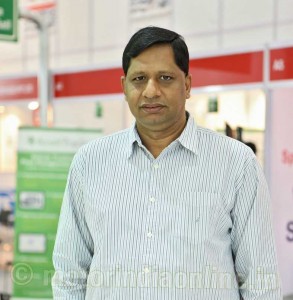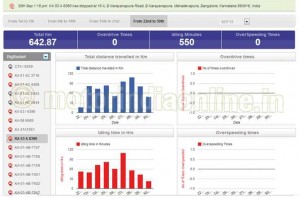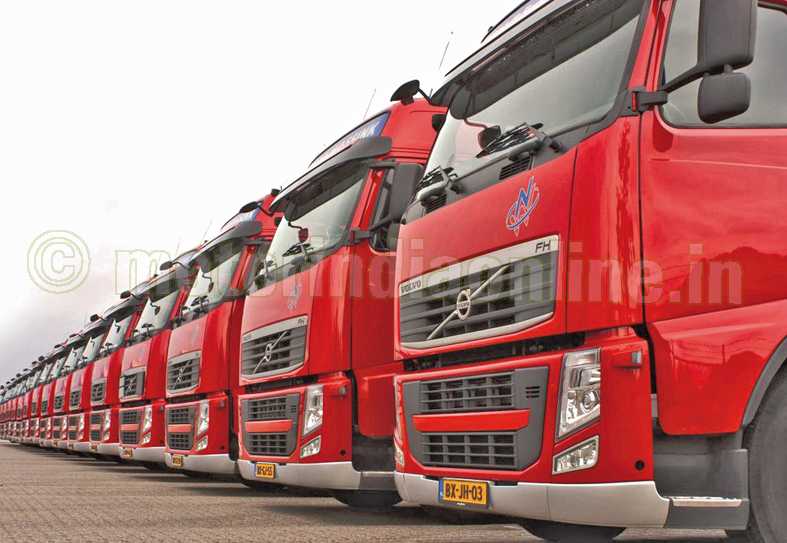
With fleet operators increasingly taking to technology and switching over to more organized fleet management methods, concepts like vehicle tracking are beginning to get popular in the Indian market. AssetTrackr, a Bangalore-based company, offers intelligent and efficient fleet management solutions which are growing in popularity and demand among commercial vehicle fleet companies and passenger cab operators, among others. We find out more about the range of fleet management solutions offered by the company from Mr. Ashok Yerneni, Founder & CEO, AssetTrackr Pvt. Ltd., in an exclusive interview.
To begin with, could you give us a background of your company? When was AssetTrackr established and what are its objectives?
The founding team of AssetTrackr comprises IIT graduates with rich experience in systems, software, enterprise applications and telematics. I was running the India center for a US-based MNC developing wireless and vehicle tracking hardware solutions for world-wide markets. When I connected with Vikas and Abhijit(the other founders) through some mutual acquaintances, we got engaged in the telematics application possibilities for India. They have a rich background in enterprise and cloud applications (having sold a company before) and we decided to combine our expertise and build solutions for the Indian market.

We felt the timing was right for the Indian market because
• Cellular connectivity costs are significantly down
• GPS/GPRS chipset prices have fallen significantly
• Google maps for India are mature
• Cloud-hosting has become mature and cost-effective
• Smartphone adoption is growing fast.
Researching the current market, we felt that the solutions were crude user-interface mash-ups with cheap Chinese imported devices and many of the customers felt the solutions were not very reliable had terrible user interfaces.
We set about to build a platform solution from ground-up that was reliable, scalable and usable. In addition, we provide a simple API mechanism that allows our customers to easily integrate our solution into their ERP systems. Many of our customers over the last two years have validated this.
Could you share details on your partnership with the US-based company? How does working together with them benefit AssetTrackr?
We have partnered with the US based company, Laird Technologies which specializes in telematics hardware, having deployed very compact tracking devices in worldwide markets. With our partnership, we have been able tightly match the hardware interfaces with our software resulting in a robust solution. Remote diagnostics capabilities are integrated into the device to help us monitor; identify and address problems remotely.

What about the range of solutions offered by your company? How is it different from what is currently available in the Indian market?
Our solutions offerings are:
• Fleet management solutions for courier, cargo, logistics, infrastructure and web based delivery companies
• Taxis services dispatch and management solutions
• Container/consignment tracking solutions.
• Bus passenger transport solution
• Corporate transport services solution
• Personal vehicle tracking solution
• Infrastructure management solutions
What are the benefits for customers who go for vehicle tracking using AssetTrackr? Please back them up with figures and details from successful results, if possible.
We spent a year and a half just developing a robust solution. Over the period we have partnered many customers in multiple segments, including DTDC, Professional Courier, Indev Logistics, Surfair Logistics, Transaid, ITC, Kesineni Cargo, BigBasket, GMR Highways, MorningStar Travels, HKB Travels, Royal Cabs, Athena Cars and Abir Infrastructure.

Our customer base is representative of the confidence we inspire among our users. We have replaced competition in many cases:
• DTDC uses our solution across all of south to track and monitor their fleet vehicles. Our odometer implementation is within 1-2% of the physical odometer. DTDC eliminated manual tracking of km travelled and use our readings to pay their vendors.
• BigBasket extensively uses our solution for their “farm-to-home” delivery concept to optimize delivery of fresh fruits/vegetables to customers. They use our REST-API interfaces extensively to schedule, monitor and notify customers on their expected time of delivery and for customer service.
• GMR Highways uses our tracking solution for monitoring and dispatching their emergency response teams on highways for attending to accidents and maintenance.
Geographically how is your presence across the country? How large is your customer base at present? Could you name some of your key customers and explain how you work with them?
Our presence is significantly in the South (Karnataka, Kerala, Tamil Nadu and Andhra Pradesh). However, we have deployments all over the country. We also work with partners in covering the North.
Comparing personal vehicles with commercial vehicles (trucks & buses), how is the perception of vehicle tracking? Where do you think the pull is higher and why?
We address both B2B and B2C segments. In B2B market, we are finding that, if we show a business value to the customer, they are willing to invest in the solution. In our experience, we find that simply providing a tracking solution is not enough anymore. The solution has to be reliable, available and provide cost savings to the customer.
In the B2C segment, we have a personal vehicle tracking solution called SafeKar. We are finding significant traction with customers who have drivers. It’s convenient for them to use their Smartphone and see where the driver is and when he is expected for pick-up or get alerted if the driver misuses the vehicle. Also, they feel a sense of security knowing where the car is at anytime, especially when family members are travelling. We have a number of unique features in the product that is finding audience with individual drivers as well.
Where does India stand when compared to other developed markets when we look at vehicle tracking as a concept? How has the progress been in the adoption of this technology?
In much of the developed world, vehicle tracking has been mature for a few years. However, in India, although companies have tried to provide solutions almost 10 years ago, the solutions were immature, very expensive and ahead of its time. Only now do we feel Google Maps is reasonably mature. Communication and hardware costs are at reasonable price points for a value conscious market like India.
Since vehicle tracking is commonly considered as an add-on feature and not an essential one, how do you plan to increase awareness about its need and benefits among customers? Is there any particular resistance to the technology, apart from common factors like product cost?
Many of the customers we target are beginning to see the value of having a tracking solution from a customer service, cost savings perspective. We feel the market is now ready and willing to pay for the solution. We publish a number of case studies with our customers and have had prospective customers call us based on these.
What are your plans for the next couple of years? Are there any new products or solutions in the pipeline?
We will continue to innovate both on hardware and software solutions to address current telematics markets and other M2M solutions. The solution opportunities are enormous, and we are really excited.